Job Board Monetization: How Do Job Boards Make Money?
Job boards can be highly profitable online businesses when monetized correctly. From paid job postings to subscriptions, advertising, and premium features, there are multiple ways a job board owner can generate consistent recurring revenue. In this article, we will explore the various strategies employed by job boards to generate revenue in the highly competitive online employment market.

Key Takeaways:
- Job boards have various revenue streams, including advertising, subscription models, and partnerships.
- Employers can boost their visibility by posting job listings or featuring their listings for increased exposure.
- Job boards can provide additional services like resume writing, optimization, and review for a fee.
- Data collected by job boards can be monetized by offering analytics and insights to employers.
- Job board owners can consider diversifying their revenue through e-commerce or software licensing.
Before diving into monetization strategies, it’s worth quickly clarifying what a job board actually is, especially if you’re new to the space.
What is a Job Board?
A job board is an online platform that allows employers to post job opportunities and candidates to discover and apply for roles. Job boards can be broad and general, or highly niche — focused on a specific industry, profession, location, or audience.
If you’re looking for a deeper breakdown of how job boards work and why they make strong online businesses, read our full guide on what is a job board?
With that foundation in place, let’s look at the most common and effective ways job boards make money.
Job Board Advertising Revenue
Job board advertising is a key component of generating revenue for online job platforms. By leveraging various advertising strategies, job boards can monetize their platforms and provide valuable exposure to employers. Let’s explore two popular methods: pay-per-click ads and banner ads.
Pay-Per-Click Ads
Pay-per-click (PPC) ads are a common form of online advertising where advertisers pay a fee each time their ad is clicked. Job boards often display PPC ads on their platform, allowing employers to target their desired audience effectively. These ads are typically displayed alongside job search results or within relevant sections of the site. By implementing PPC ads, job boards create a win-win scenario: employers gain targeted exposure, and job boards generate revenue for each click.
Banner Ads
Banner ads are another popular advertising format used by job boards. These graphical advertisements are strategically placed on the platform to capture the attention of job seekers and employers. With visually appealing design and engaging content, banner ads can effectively promote specific job listings, career-related services, or employer brands. Job boards charge advertisers for banner ad placements, offering different pricing options based on factors such as ad size, placement location, and duration of display.
Job board advertising revenue plays a crucial role in sustaining the operations of online job platforms. By implementing pay-per-click ads and banner ads, job boards can create a profitable business model while providing valuable opportunities for employers to reach their target audience effectively.
Job Postings and Featured Listings
One of the primary ways job boards generate revenue is through job postings and featured listings. Employers have the option to post their job openings on the platform, increasing their visibility among job seekers. In addition, they can choose to feature their listings, giving them additional prominence and reach.
Job postings allow employers to directly connect with potential candidates, while featured listings provide enhanced visibility, ensuring that job opportunities stand out among the competition. By offering these options, job boards not only facilitate the hiring process for employers but also provide valuable opportunities for job seekers.
Featured listings offer employers the ability to promote their job openings in a way that attracts more attention. These listings may appear at the top of search results, appear in a separate section on the job board’s homepage, or receive other special placement options.
Employers can choose to promote their job listings using various methods, such as sponsored job listings or boosted listings. These options usually involve a fee, allowing job boards to monetize their platforms and provide added value to employers.
Benefits of Job Postings and Featured Listings
Job postings and featured listings offer several advantages for both employers and job seekers:
- Enhanced Visibility: Job postings and featured listings increase the visibility of job opportunities, ensuring that they are seen by a larger audience of qualified candidates.
- Targeted Advertising: Employers can tailor their job listings to reach specific demographics or industries, ensuring that their opportunities are seen by the right candidates.
- Increased Response Rate: Job postings and featured listings attract more attention, leading to a higher response rate from job seekers.
- Improved Matching: By providing detailed job descriptions and requirements, employers can attract candidates who are well-suited for the position, improving the overall quality of applicants.
“Job postings and featured listings provide valuable opportunities for both employers and job seekers, offering increased visibility and improved matching for a successful hiring process.”
Employers can leverage the power of job postings and featured listings to reach a larger pool of qualified candidates and find the perfect fit for their open positions. Meanwhile, job seekers benefit from the increased visibility of job openings and have a better chance of finding their dream job through the platform.
Subscription Models and Premium Services
Job boards have the opportunity to generate additional revenue by offering subscription models and premium services to both job seekers and employers. These offerings provide added benefits and access to specific features, enhancing the overall user experience on the platform.
For job seekers, subscription models can provide exclusive perks such as early access to job postings, personalized job recommendations, and priority support. These premium subscriptions offer a more tailored and efficient job search process, saving time and increasing the chances of finding the perfect opportunity.
Employers, on the other hand, can benefit from premium services that amplify their recruitment efforts. By subscribing to premium packages, employers gain access to enhanced job listings with greater visibility, priority placement in search results, and advanced analytics for improved performance tracking. This helps employers attract top talent and streamline their hiring processes.
“Premium services go beyond the standard features and provide added value to job seekers and employers, creating a win-win situation.”
Take, for example, JobBoardHub, a leading job board platform that offers premium subscriptions for both job seekers and employers. Their subscription models include:
Job Seeker Premium Subscription:
- Early access to new job postings
- Personalized job recommendations based on job seeker preferences
- Premium customer support with faster response times
- Resume optimization and featured profile placement
Employer Premium Subscription:
- Featured job listings with increased visibility and priority placement
- Advanced analytics and performance tracking
- Premium customer support with dedicated account manager
- Prominent employer branding and customized company profiles
These subscription models and premium services offer job boards a reliable and recurring source of revenue, while simultaneously providing added value to their users. By catering to the diverse needs of both job seekers and employers, job boards can create a sustainable business model that drives success in the competitive online employment market.

Resume Database Access
As job boards aim to connect employers with the right candidates, one valuable resource they offer is access to a comprehensive resume database. Through resume database access, employers can efficiently search for and connect with qualified candidates, streamlining the hiring process and saving valuable time.
The resume database feature enables employers to conduct targeted candidate searches based on specific criteria such as skills, experience, location, and education. By utilizing powerful search filters, employers can quickly identify potential candidates who meet their job requirements and qualifications.
Resume database access offers employers several advantages:
- Wider Candidate Reach: Employers have the opportunity to reach a broader pool of potential candidates by accessing a diverse resume database. This expansive collection of resumes allows them to consider candidates who may not have applied directly to their job postings.
- Efficient Candidate Screening: With resume database access, employers can efficiently screen candidates based on their desired qualifications and preferred criteria. This targeted approach ensures that only relevant resumes are considered, saving time and effort during the initial screening process.
- Enhanced Candidate Engagement: Employers can proactively connect with potential candidates they discover in the resume database. This direct outreach allows for personalized communication, enabling employers to establish meaningful connections with candidates and increase the likelihood of successful hires.
“Resume database access empowers employers to discover high-potential candidates who may not have submitted applications, providing a competitive advantage in the talent acquisition process.”
Job boards typically offer various subscription models or packages that grant employers different levels of resume database access. These subscription options can range from basic search capabilities to advanced features that include additional candidate insights and analytics.
To illustrate the benefits of resume database access, let’s consider a popular job board:
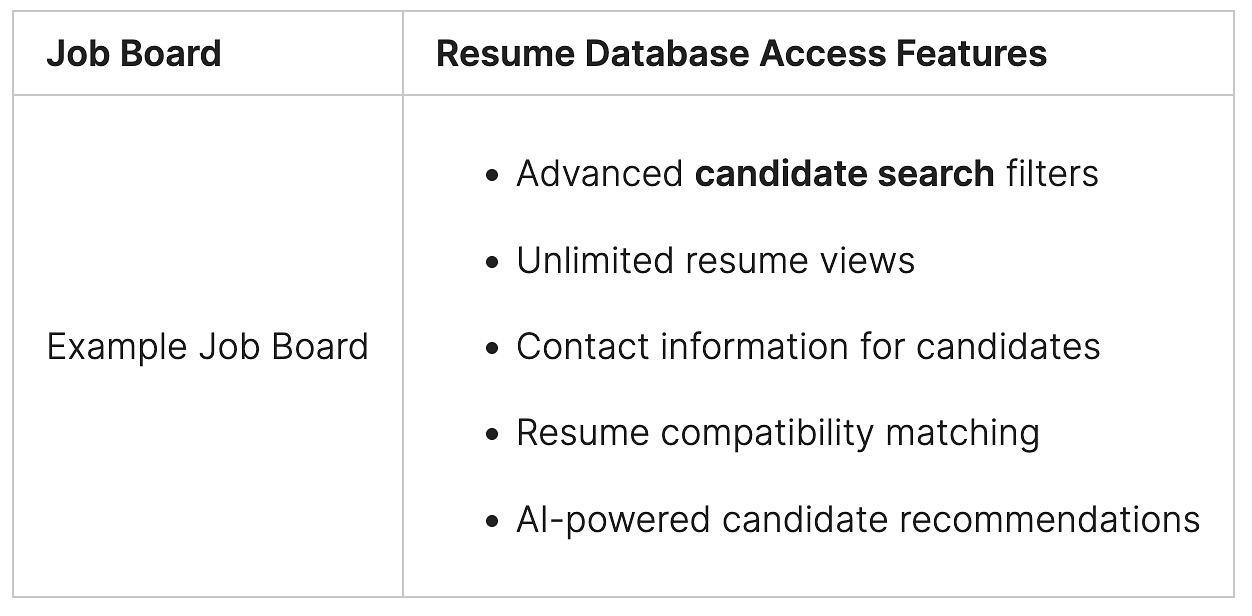
By offering resume database access as part of their services, job boards provide employers with a valuable tool to effectively identify and connect with top talent. This feature enhances the overall recruitment experience, empowering employers to find the right candidates efficiently and ultimately drive successful hiring outcomes.
Job Board Partnerships and Affiliations
Job boards have the potential to expand their revenue streams through strategic partnerships and affiliations with relevant websites or organizations. By leveraging job board partnerships and affiliate programs, job board owners can tap into new sources of income and enhance their platform’s reach.
Collaborating with other industry players allows job boards to pool resources, share expertise, and create mutually beneficial opportunities. This collaboration can take various forms, including cross-promotions, co-branding initiatives, or joint marketing campaigns. By joining forces, job boards can amplify their visibility and attract a wider audience of job seekers and employers.
Furthermore, partnering with niche-specific websites or industry organizations can provide job boards with access to targeted audiences. This allows them to cater to the specific needs of job seekers and employers within a particular industry or job type. Such partnerships can drive increased engagement and user satisfaction, ultimately leading to higher revenue generation.
In addition to partnerships, job boards can also explore affiliate programs to monetize their platform. By partnering with affiliate networks, job boards can earn commissions for referring job seekers or employers to related products, services, or platforms. These partnerships provide an additional revenue stream while delivering value to users who can benefit from expanded offerings.
Overall, job board partnerships and affiliations offer a pathway to increased revenue generation and a broader market presence. By collaborating with relevant websites or organizations, job boards can leverage collective strengths and create lasting value for their stakeholders.
Benefits of Job Board Partnerships and Affiliations:
- Expanded reach and visibility through cross-promotion.
- Access to targeted audiences in specific industries or job types.
- Opportunities for co-branding and joint marketing initiatives.
- Additional revenue streams through affiliate programs.

By embracing the power of collaboration and strategic alliances, job boards can unlock new opportunities for growth and profitability. Engaging in partnerships and affiliations opens doors to wider audiences, enhanced offerings, and increased revenue streams.
Job Board Resume Services
Job boards play a crucial role in connecting job seekers with potential employers. While job seekers primarily rely on job boards for finding job opportunities, these platforms can also provide valuable resume services to enhance the job search process.
Resume writing, optimization, and review are essential aspects of building a strong job application. Job boards can leverage their expertise and user-friendly platforms to offer these services to job seekers, helping them stand out from the competition.
Resume writing services provided by job boards involve professional resume writers who craft tailored resumes that highlight a candidate’s skills, experience, and achievements. These expertly written resumes can significantly improve a job seeker’s chances of getting noticed by hiring managers.
Resume optimization services offered by job boards focus on enhancing a resume’s visibility in online databases and applicant tracking systems (ATS). By optimizing the resume with relevant keywords and formatting, job seekers can increase the likelihood of their resumes getting shortlisted for job opportunities.
Job boards may also provide resume review services, where experienced professionals evaluate a candidate’s existing resume and offer feedback on its structure, content, and overall effectiveness. This review process can help job seekers identify areas for improvement and make necessary adjustments to create a more compelling resume.
Job board resume services can be particularly beneficial to job seekers who may lack the time or expertise to create an impactful resume. By utilizing these services, job seekers can gain a competitive edge in the job market, increasing their chances of securing interviews and landing their desired positions.
Benefits of Job Board Resume Services:
- Expertly written resumes crafted by professional writers
- Optimized resumes to increase visibility and match job requirements
- Insightful feedback and recommendations to enhance resume effectiveness
- Time-saving for job seekers who may not have the expertise or resources to create compelling resumes
By offering resume services, job boards can provide comprehensive support to job seekers throughout their job search journey, ensuring they present their qualifications in the best possible light.

Featured Employers and Employer Branding
One effective way for job boards to generate revenue is by offering employers the opportunity to increase their visibility and promote their brand through featured profiles on the platform. This feature allows employers to stand out from the competition and attract top talent.
With employer branding becoming increasingly important in today’s competitive job market, job boards play a crucial role in helping companies showcase their unique employer value proposition. By featuring employers prominently on their platform, job boards provide a platform for employers to communicate their company culture, values, and benefits to potential candidates.
Benefits of being a featured employer:
- Enhanced Visibility: Featured employers receive increased visibility on the job board, ensuring their job postings and profiles are more prominently displayed to job seekers.
- Brand Promotion: Employers can promote their brand image and values, attracting candidates who align with their company culture.
- Talent Attraction: Featured employers are more likely to attract top talent, as their profiles are showcased as preferred employers on the job board.
- Competitive Advantage: By featuring employers, job boards offer a competitive advantage by providing a platform for employers to differentiate themselves from other companies.
Employers can leverage their featured profiles to showcase their unique perks, benefits, and career growth opportunities. This helps them attract candidates who are more likely to identify with their values and goals, ultimately improving the quality of applicants.
By featuring employers and enabling them to effectively communicate their brand values and attract talent, job boards create a win-win situation for both employers and job seekers.
Furthermore, featuring employers on job boards allows job seekers to gain insights into a company’s culture, values, and work environment, helping them make informed decisions when considering potential employers.
Below is a table highlighting the benefits and features of a featured employer profile:
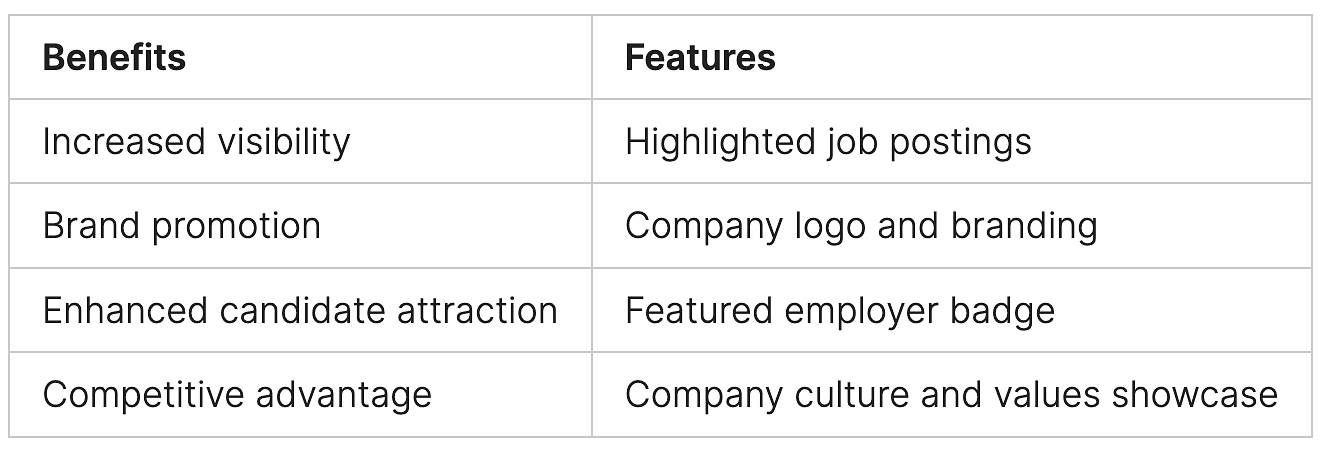
Being a featured employer on a job board provides valuable exposure and helps employers attract the right talent that aligns with their company culture and values. It’s a mutually beneficial opportunity that allows job boards to generate revenue while providing employers with a platform to enhance their employer branding efforts.
Job Board Data and Analytics
In today’s data-driven world, job boards have access to a vast amount of valuable information. By leveraging data analytics, job boards can provide employers with valuable job market insights and industry trends, empowering them to make informed hiring decisions.
Data analytics allows job boards to collect and analyze large volumes of data, providing valuable insights into the current state of the job market. This includes information on job seekers’ preferences, skills in demand, and emerging industry trends. By understanding these trends, employers can align their hiring strategies with the needs of the job market, ensuring they attract top talent and stay competitive.
How Job Boards Monetize Data Analytics
Job boards can monetize their data analytics capabilities by offering employers access to comprehensive reports and analytics tools. These tools provide valuable insights into the job market, allowing employers to gain a competitive edge.
“Data analytics have revolutionized the way employers make hiring decisions. Job boards that provide actionable insights and industry trends are invaluable resources for businesses.” - Hiring Manager, XYZ Company
The primary ways job boards monetize data analytics include:
- Subscription-Based Analytics: Job boards can offer employers subscription-based access to their analytics platform. This enables employers to access real-time data, customized reports, and personalized recommendations on hiring strategies.
- Customized Reports: Job boards can provide employers with customized reports tailored to their specific industry or job requirements. These reports offer in-depth analysis and insights into market trends, salary benchmarks, and candidate demographics.
- Industry Insights: Job boards can curate industry-specific insights to help employers stay up-to-date with the latest trends and developments. This includes identifying emerging skills, regional job market fluctuations, and anticipated hiring challenges.
By offering these data analytics services, job boards provide employers with a competitive advantage in the talent acquisition process. Employers can optimize their hiring strategies, target the right candidates, and stay ahead of industry trends.
Example: Job Market Insights Report
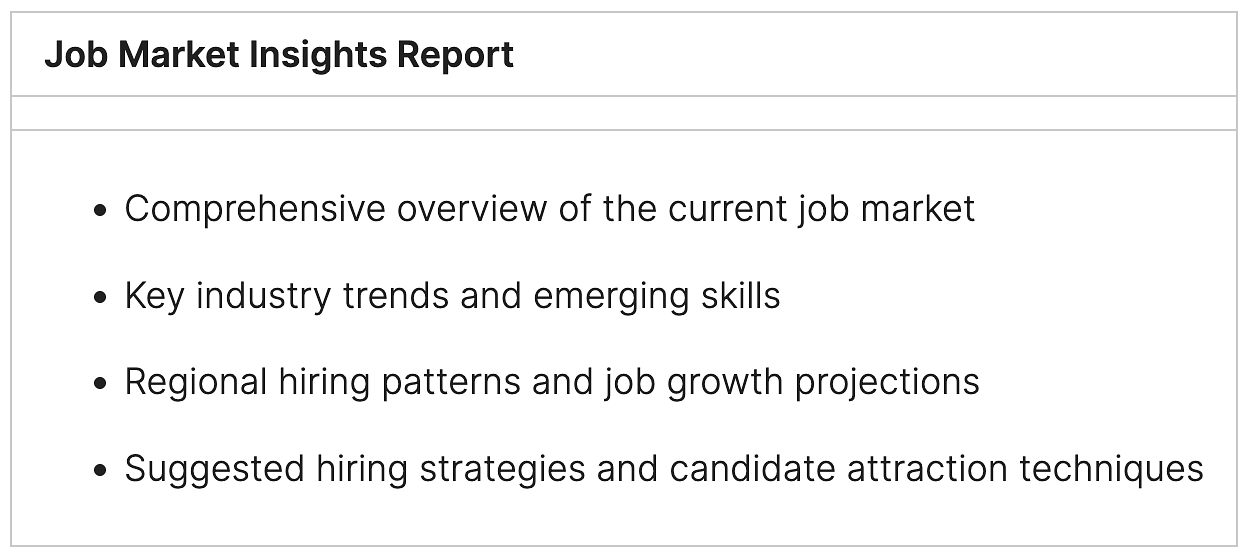
The Job Market Insights Report provides employers with a comprehensive overview of the current job market landscape. It includes critical industry trends, emerging skills in demand, regional hiring patterns, and suggested hiring strategies. By leveraging this report, employers can make well-informed decisions and optimize their hiring efforts.
In conclusion, job board data and analytics empower employers with valuable job market insights and industry trends. By monetizing their data analytics capabilities, job boards can provide employers with the tools they need to make informed hiring decisions and stay ahead in a competitive job market.
Job Board Membership and Access Fees
In today’s competitive job market, job boards are constantly seeking innovative ways to generate revenue and provide value to their users. One such method is through the implementation of membership and access fees. These fees allow job seekers and employers to access exclusive features or a premium membership experience, enhancing the overall job search and recruitment process.
Membership fees provide job seekers with additional benefits and resources that can help them stand out in a crowded job market. By paying a recurring or one-time fee, job seekers gain access to premium features such as personalized job alerts, resume enhancements, and priority customer support. These added perks can significantly increase their chances of finding the right job quickly and efficiently.
Employers, on the other hand, can take advantage of access fees to unlock advanced recruitment tools and gain a competitive edge in attracting top talent. By paying a fee, employers can access features such as candidate filtering, advanced search options, and enhanced job listings that receive increased visibility. These benefits enable employers to streamline their hiring process, target the right candidates, and maximize their chances of finding the perfect fit for their organization.
“Paying a membership or access fee on a job board is like investing in your career or recruitment efforts. It offers access to exclusive resources and features that can give you a significant advantage in today’s highly competitive job market.”
While membership and access fees may require an initial investment, they are often cost-effective in the long run. The benefits and opportunities provided to job seekers and employers can outweigh the associated costs, making it a worthwhile investment for those serious about their career or recruitment needs.
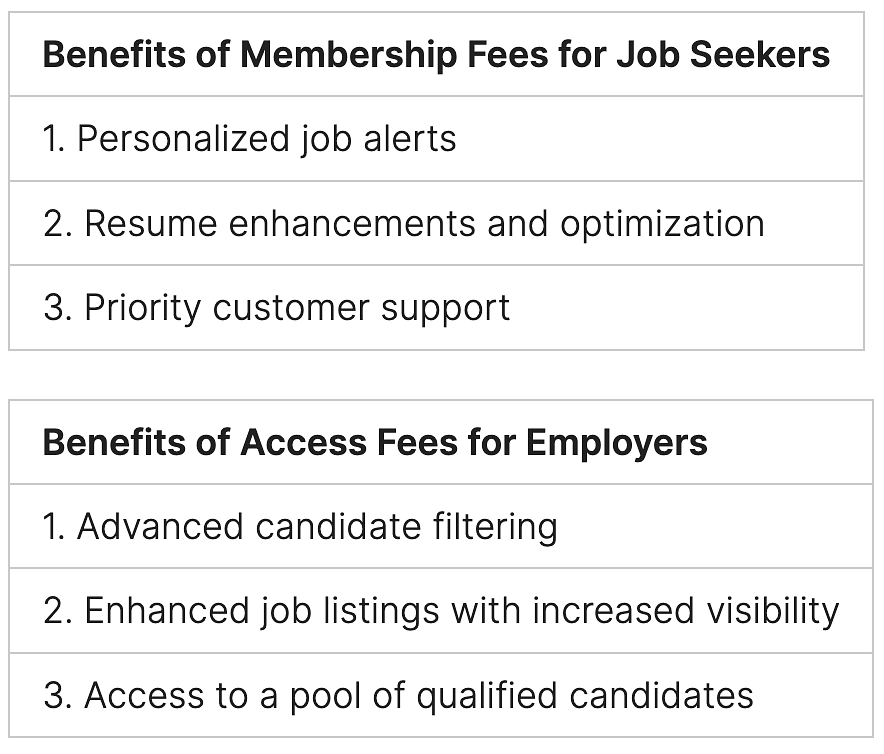
E-commerce and Product Sales
Job boards can explore new revenue streams by leveraging e-commerce opportunities and implementing product sales. By selling merchandise related to the job board’s brand or career-related products, job boards can not only generate additional income but also strengthen their brand presence in the industry.
One way to approach e-commerce is by offering branded merchandise such as t-shirts, mugs, and stationery items featuring the job board’s logo or slogan. These products can be sold directly through the job board’s website, providing job seekers and employers with the opportunity to show their support and affiliation with the platform. This not only generates revenue but also helps to create a sense of community and brand loyalty among users.
Another avenue for e-commerce is to provide career-related products and resources that add value to job seekers and employers. These can include resume templates, interview preparation guides, career coaching services, or online courses. By offering these products, job boards can position themselves as comprehensive career development platforms, catering to the needs of both job seekers and employers beyond the traditional job matching process.
“With well-designed products and strategic marketing, job boards can turn their platform into a one-stop-shop for career-related resources, serving as a trusted partner in the job search journey.”
E-commerce and Product Sales Table
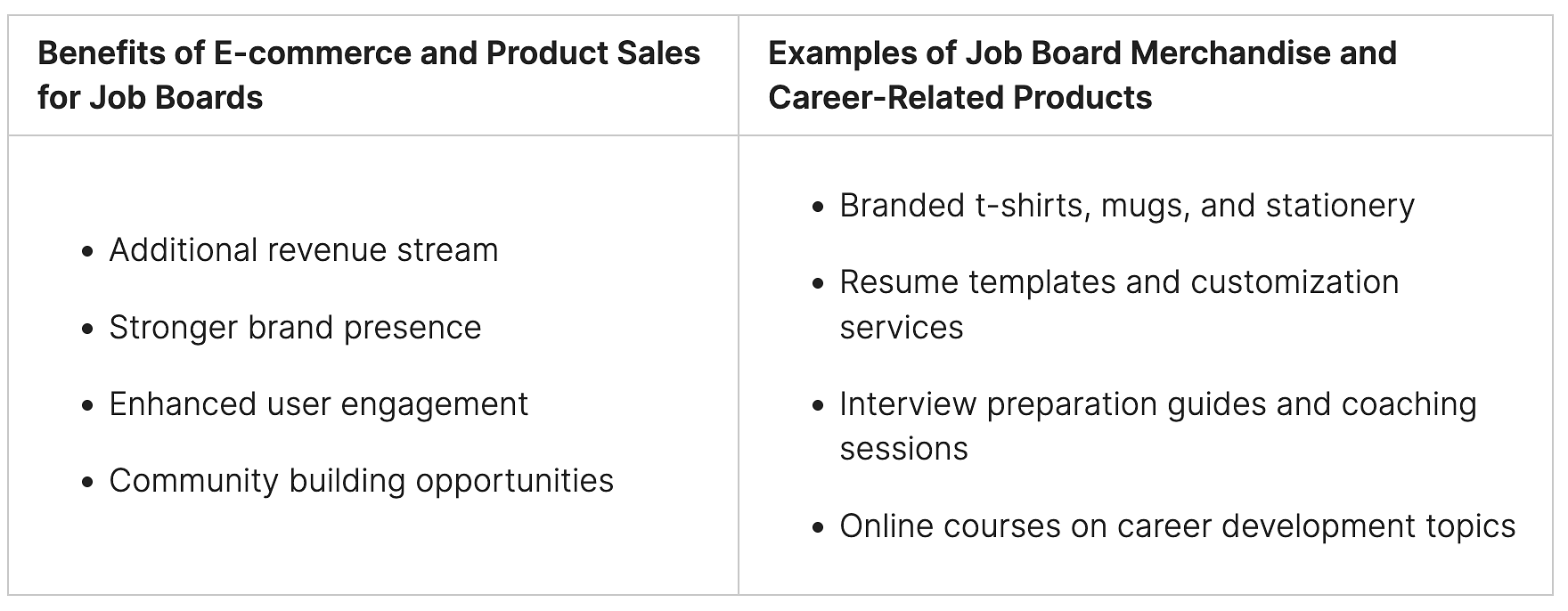
By strategically implementing e-commerce and product sales, job boards can not only diversify their revenue streams but also provide added value to their users. It is crucial for job boards to understand their target audience’s needs and preferences in order to offer relevant and high-quality products. Through e-commerce, job boards can expand their influence in the job market and position themselves as trusted sources for career-related resources.
Job Board Software Licensing
Job board software licensing is a lucrative opportunity for job board owners to generate additional income by licensing their platform to other organizations or individuals. This unique business model allows them to capitalize on the demand for customizable job board solutions while establishing their brand as a trusted provider in the industry.
With software licensing, job board owners can offer their platform as a white-label solution, enabling licensees to rebrand and customize the job board according to their specific needs. By providing a comprehensive software package, licensees can launch their own job board quickly and efficiently, without the need for extensive development or design resources.
One of the key benefits of job board software licensing is the platform as a service (PaaS) model it offers. This means that the licensees receive ongoing technical support, updates, and maintenance from the job board software provider. This allows them to focus on building their user base and providing a seamless experience for job seekers and employers, without the burden of managing the underlying technology.
Job board software licensing provides a win-win situation for both the licensees and the software providers. Licensees can leverage the expertise and infrastructure of established job board platforms, while software providers can expand their reach and generate recurring revenue through licensing fees.
By licensing their job board software, owners can tap into a broader market and reach audiences beyond their own target demographic. This can lead to increased exposure, brand recognition, and ultimately, more licensing opportunities. Additionally, the revenue generated from licensing fees can help job board owners diversify their income streams and fuel further innovation within their own platform.
Overall, job board software licensing offers a mutually beneficial arrangement for all parties involved. It allows job board owners to monetize their expertise and technology while enabling licensees to quickly establish their presence in the competitive job board market. As the demand for customizable job board solutions continues to grow, software licensing presents a lucrative opportunity for both established job board platforms and aspiring entrepreneurs.

Conclusion
Job board monetization is a crucial aspect of running a successful online employment platform. By implementing various strategies, job boards can generate revenue while providing valuable services to job seekers and employers.
Throughout this article, we explored different ways that job boards can monetize their platforms. This includes advertising revenue through pay-per-click ads and banner ads, as well as job postings and featured listings that offer enhanced visibility to employers. Additionally, job boards can offer subscription models and premium services, resume database access, and resume services to create additional revenue streams.
Partnerships and affiliations with relevant organizations, along with the sale of merchandise and licensing their software, provide further opportunities for job boards to generate income. Data analytics and insights can also be monetized, providing valuable information to employers in making informed hiring decisions.
In the competitive online job market, it is essential for job boards to explore multiple monetization strategies to ensure the sustainability and growth of their platforms. By offering a range of services and features, job boards can attract both job seekers and employers, ultimately leading to a thriving online employment ecosystem.
Resources
- Job Board Doctor
- Job Board Secrets
- Top Job Board Software Platforms
- Job Boardly - Job Board Software
FAQ
How do job boards profit?
Job boards profit through various strategies, including advertising revenue, job postings and featured listings, subscription models and premium services, resume database access, partnerships, resume services, featured employers and employer branding, data and analytics, membership and access fees, e-commerce and product sales, job board software licensing, and more. These revenue streams enable job boards to generate income while providing valuable services to job seekers and employers.
What are the types of job boards?
Job boards can be categorized into different types, including niche job boards that focus on specific industries or job types, such as healthcare or technology, and general job boards that cater to a wide range of job seekers and employers. Niche job boards offer targeted opportunities for specialized professionals, while general job boards provide a broader platform for job search and recruitment.
How do job boards generate revenue through advertising?
Job boards generate revenue through advertising by offering various advertising options to employers. This includes pay-per-click ads, where employers pay a fee every time their ad is clicked, and banner ads displayed on the job board platform. These advertising strategies allow job boards to monetize their platform while helping employers increase their visibility and attract qualified candidates.
How do job boards make money from job postings and featured listings?
Job boards make money by offering employers the option to post job listings or feature their listings for increased visibility and reach. Employers pay a fee to post their job openings on the job board, and they may also choose to feature their listings, which ensures their job postings are displayed prominently to job seekers. This allows job boards to generate revenue while providing valuable exposure to employers.
What are subscription models and premium services offered by job boards?
Job boards can monetize their platforms by offering subscription models and premium services to job seekers and employers. Subscription models may include different tiers of membership with varying benefits, such as enhanced access to job listings, resume database access, or additional features. Premium services can include targeted job alerts, resume writing assistance, or priority customer support, which are offered for an additional fee to users.
How do job boards generate revenue from resume database access?
Job boards can generate revenue by offering employers access to their resume databases. Employers pay a fee to search for and connect with qualified candidates through the job board’s database. This provides a valuable resource for employers to find suitable candidates, while job boards generate income from offering this service.
Can job boards generate income through partnerships and affiliations?
Yes, job boards have the potential to generate income through partnerships and affiliate programs with other relevant websites or organizations. By collaborating with complementary platforms or offering referral programs, job boards can earn a percentage of revenue from each successful referral or collaboration, creating additional sources of income.
Do job boards offer resume services for a fee?
Some job boards offer resume services to job seekers for a fee. These services may include resume writing, optimization, or review by professional resume writers or career experts. By providing resume services, job boards not only assist job seekers in presenting their qualifications effectively but also generate revenue from these additional services.
How do job boards generate revenue through featured employers and employer branding?
Job boards can generate revenue by offering employers the opportunity to be featured or promote their brand through enhanced profiles on the platform. Employers may pay a fee to have their company logo, description, or additional information showcased prominently on the job board, increasing their visibility to job seekers and effectively enhancing their employer branding efforts.
How can job boards monetize data and analytics?
Job boards can monetize the data they collect by providing analytics and insights to employers. By analyzing job market trends, industry insights, or candidate demographics, job boards can offer valuable data to employers, enabling them to make informed hiring decisions. These data and analytics services can be offered through subscriptions or as part of premium membership packages.
Do job boards charge membership or access fees?
Yes, some job boards charge membership or access fees to job seekers or employers. Job seekers may pay a recurring or one-time fee to access certain features or a premium experience on the job board. Employers may also be required to pay fees to access advanced recruitment tools or to post job listings. These fees contribute to the job board’s revenue stream.
Can job boards generate income through e-commerce and product sales?
Job boards can diversify their revenue streams by selling merchandise or products related to careers or the job market. This can include branded merchandise, such as t-shirts or mugs, or career-related products like resume templates or interview guides. E-commerce allows job boards to generate income while providing additional value to their audience.
How do job board software licensing options work?
Job board software licensing allows job board owners to generate income by licensing their platform to other organizations or individuals. This can include white-label job board solutions, where the licensing party can rebrand the platform as their own and operate their job board using the licensed software. Software licensing provides a revenue stream for job board owners while expanding the reach of their platform.
